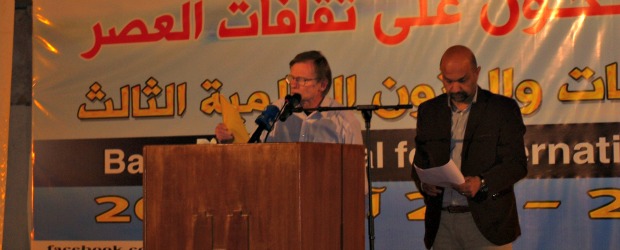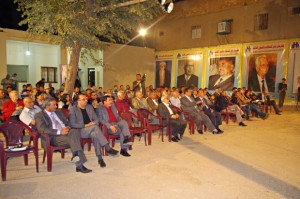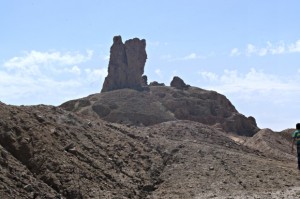You have no items in your cart. Want to get some nice things?
Go shopping
“Welcome in Iraq.” “Welcome in Iraq.” There were countless times I heard that phrase, from officials, strangers and poets. It was as if these proud and hospitable people, who had been battered by more than thirty years of brutal dictatorship, and then military invasion and occupation, and continuing terrorist outrages, were simply expressing gratitude that anyone from the outside world should take any interest in them at all.
Friend and fellow poet Agnes Meadows had attended the first Babylon Festival of International Arts and Cultures in 2012. Invited back this year, the organisers asked her to ask a fellow Briton as well. When she phoned me about a month ahead of time I leapt at the idea. Then I thought, “Will it be safe?” That, I am sure, is the thought everyone would have on considering a trip to Iraq. But Agnes, and two other previous attendees, assured me that because the event was masterminded by Iraq’s Ministry of Culture, the needs, and especially the safety, of delegates were a top priority. Additionally, my previous experience working in television news, with many trips to the Middle East, told me that no matter how scary a place might look to the world at large, away from the cameras life always goes on in a pretty normal fashion. News does not report ordinary life.
There was a nervous wait in the last few days for the necessary visa and air ticket to come through, but on Friday March 21st we met at Gatwick for the direct over-night flight to Baghdad. We were accompanied by Ahmed Mukhtar, a London-based Iraqi musician. On arrival we waited a couple of hours for an Indonesian poet, Dorothea Rosa Herliany, to fly in from Berlin and then piled into a huge station wagon for the two hour drive south to Babylon. The landscape is flat, dusty and ugly. Along the road we saw armed watch towers and there were regular checkpoints. At these our driver merely proffered the right piece of paper – I guessed a letter from the Minister – and we were waved through. I realised that for an independent traveller journeying around Iraq would be very difficult indeed.

The festival is based in Al Hillah, a city of 400,000 people a few kilometres from ancient Babylon. A taste of what was to come was the fact that, instead of being taken to our hotel, we were thrust directly into the business of the festival. Babylon House is an arts centre on the banks of the Euphrates and was the focal point of all the activities. It has a performance space outside, several exhibition rooms, and a huge inner courtyard. Notwithstanding that I had been continuously awake for more than 24 hours, we were now surrounded by TV cameras, interviewers and artists, all wanting an opinion on the festival and everything to do with it. A young lady was exhibiting photographs. “What do you think of these?” we were asked. “Please write in here.” If they had not been so patently genuine and enthusiastic it might have been overwhelming. Then, suddenly, we were on the move again. We walked along the river, through the souk with its bewildering variety of little shops selling everything from gold jewellery to air compressors, and were finally ushered into a tiny gallery down an ancient alley. Here was an exhibition of German photographers. The place was crowded: more cameras, more noise. Then another walk to a typical Iraqi restaurant for lunch. A chance to sit, chat, and introduce ourselves. Slowly, over the next few days, I would get to know poets from Egypt, Yemen, Turkey, Iraq and Syria. Also soon to arrive were the festival’s European co-ordinator, Tobias Berghard, a poet and translator from Germany, and his poet wife Jona, an Argentinean.
Most of the festival’s activities took place in the evenings: typically readings of poetry, discussions of literature and film screenings. Most of it, of course, in Arabic. We were treated to a series of poets, with big poets’ voices, intoning in a serious and weighty manner. As Agnes said, when she had worked in Palestine nearly all the poetry was about the intifada, and she suspected that here all the poetry was about the dictatorship and the war. Did that matter? Not at all. I would far rather be amongst serious writers with experience in matters of real consequence than the usual middle-class navel-gazing which makes up most literary festivals. Non-Arabic poets such as us had had their submitted poetry translated in advance, and it was read by Dr Ali Al Shalah, a renowned Iraqi poet who spent many years in exile. He was the organizer of the entire event and is Chairman of the Media and Culture Committee within the new Iraqi government. Everything was covered by Iraqi television. And everyone there, it seemed to me, was crazy to take photographs. One was constantly dragged into group shots, or grabbed by a complete stranger to pose for the moment. All very friendly and enthusiastic.
Daytimes were devoted to a series of exceptionally interesting visits and meetings: ancient Babylon; one of Saddam’s eighty or so palaces (apart from being a merciless butcher he also had dreadful taste in interior design); a newly-established institute documenting his crimes and helping the families of his victims; the site of one of the many previously unknown mass graves. I talked to a charming young woman whose father, brother and grandfather had all been murdered by Saddam’s regime.

For me there were two real highlights. The first was the Tower of Nemrut, a huge vertical structure out in the desert. It has something of a claim to being the remains of the Tower of Babel. Casually lying on the ground was a piece of brick with cuneiform inscriptions. It was later confirmed by archaeologist Richard Dumbrill, another visitor to the festival, to date from 1800 BC. The inscriptions related to the management of water. Such finds are plentiful and looting has been a major problem. Secondly a group of us was invited to the offices of BROB, an NGO devoted to women’s rights. They do legal and educational work, and provide immediate assistance to women on the run from abusive families. 95% of Iraqi marriages are arranged, and birth control is ignored or disapproved of. Women have no economic power and no control over their lives. Some of the stories we were told were horrifying. We met one woman who, having given birth to five girls, was tortured by her husband by him putting his cigarettes out on her arm. Eventually, having found BROB in secret, she was helped to obtain a divorce, to regain custody of her children, and later still, to obtain redress in the courts. But these small victories are few and far between.
All this time we got to experience a typical Iraqi city: busy, noisy, smelly and ugly. However what should be emphasised is how normal it all is: ordinary people making a living, looking after their families, watching Spanish football, having coffee at night on the pavement. True, there is a heavy armed police and military presence, which increases at night. But life clearly goes on. As delegates to the festival, we had virtually no free time and we definitely could not wander where we pleased. On the other hand, we had access to people and places which would be denied to the independent traveller, and, where it mattered, doors were magically opened.
When a country has suffered so long and hard as Iraq, the first priorities must be the establishment of security and the setting up of proper, long-lasting democratic institutions. The continued functioning of electricity, fresh water and sewerage is also essential. But hot on the heels of these must come a growth of trade and the establishment of artistic and sporting links. Ancient Mesopotamia is commonly seen as the birthplace of civilization; modern Iraq deserves all the help it can get to properly rejoin the community of nations. The Babylon Festival is a small but essential piece of that endeavour.

About Graham Buchan
Having graduated as a Chemical Engineer, he developed an alternative freelance career in the US and British film, TV and video industries. He has visited over fifty countries which include communist dictatorships, theocracies, absolute monarchies and countries undergoing revolution (violent and non-violent) and economic meltdown. He has published travel writing, short fiction, dozens of art and film reviews and four books of poetry.



